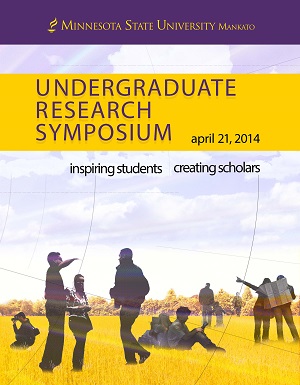Location
CSU 255
Start Date
21-4-2014 3:15 PM
End Date
21-4-2014 4:15 PM
Student's Major
Gender and Women's Studies
Student's College
Social and Behavioral Sciences
Mentor's Name
Amy Sullivan
Mentor's Department
Gender and Women's Studies
Mentor's College
Social and Behavioral Sciences
Description
The idea body type for women in the United States now requires not only a thin physique, but visible muscle definition and fitness, as well. This athletic body type must still poses feminine qualities such as large breasts, a small frame, and curves. This new level of perfection has been created by advertisements, fitness magazines, and internet memes. However, this ideal body type is still computer generated, created from parts of multiple women, and largely unobtainable. Since its emergence, little research has critically assessed these images and their effects of women’s self-evaluations. A feminist perspective will used to determine what these advertisements, photographs, and memes are really conveying to women. A sample size of 50 advertisements will be used and patterns will be identified such as extremely fit and thin bodies, emphasis on impossible levels of socially defined beauty, and the sexualization of the female body. Auto-ethnographic findings are expected to indicate that these images lead to internalization and idolization, which result in feelings of shame, guilt, embarrassment, excessive exercising, and dieting in pursuit of this impossible physique. Though this study focuses on a single woman’s experience with these images, it has large implications for women everywhere. Those who internalize these images may experience similar psychological discomfort and physical injury in pursuit of an impossible ideal. Education provided by this study could deter such harms and prevent psychological and biological issues associated with striving for this new ideal body type.
Creative Commons License

This work is licensed under a Creative Commons Attribution 4.0 International License.
A Critical Analysis of Media Images Depicting the New Athletic Body Ideal and One Woman’s Experience with Them
CSU 255
The idea body type for women in the United States now requires not only a thin physique, but visible muscle definition and fitness, as well. This athletic body type must still poses feminine qualities such as large breasts, a small frame, and curves. This new level of perfection has been created by advertisements, fitness magazines, and internet memes. However, this ideal body type is still computer generated, created from parts of multiple women, and largely unobtainable. Since its emergence, little research has critically assessed these images and their effects of women’s self-evaluations. A feminist perspective will used to determine what these advertisements, photographs, and memes are really conveying to women. A sample size of 50 advertisements will be used and patterns will be identified such as extremely fit and thin bodies, emphasis on impossible levels of socially defined beauty, and the sexualization of the female body. Auto-ethnographic findings are expected to indicate that these images lead to internalization and idolization, which result in feelings of shame, guilt, embarrassment, excessive exercising, and dieting in pursuit of this impossible physique. Though this study focuses on a single woman’s experience with these images, it has large implications for women everywhere. Those who internalize these images may experience similar psychological discomfort and physical injury in pursuit of an impossible ideal. Education provided by this study could deter such harms and prevent psychological and biological issues associated with striving for this new ideal body type.
Recommended Citation
Mischke, Kelsey. "A Critical Analysis of Media Images Depicting the New Athletic Body Ideal and One Woman’s Experience with Them." Undergraduate Research Symposium, Mankato, MN, April 21, 2014.
https://cornerstone.lib.mnsu.edu/urs/2014/oral_session_15/2




